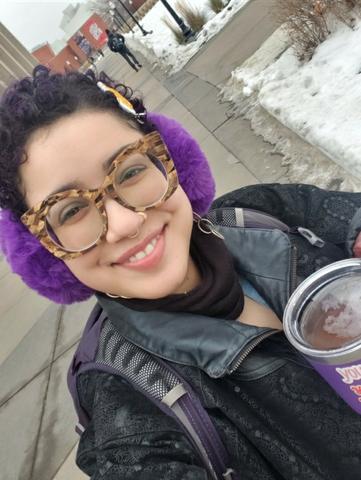
Nicole T. Quintus
Pronouns: she/her
E-MAIL: [email protected]
Undergraduate Institution and Major:
University of Arizona - Tucson, B.S. in Neuroscience and Cognitive Science, 2017
University of Arizona - Phoenix Biomedical Campus, M.S. in Clinical Translational Science, 2021
Graduate Advisor
Patrick Rothwell, Ph.D., Department of Neuroscience
Graduate Research:
My primary research interest is investigating the molecular etiology of mood disorders and how they may arise from both social and environmental stress. I aim to identify novel, druggable targets and utilize them as therapeutic interventions for those living with mood disorders.
Graduate Publications
- Kim, HD., Wei, J., Call, T., Ma, X., Quintus, N.T., Summers, A.J., Carotenuto, S., Johnson, R., Nguyen, A.A., Cui, Y., Park, J.G, Qiu, S., Ferguson, D. “SIRT1 coordinates transcriptional regulation of neural activity and modulates depression-like behaviors in the nucleus accumbens” (Submitted, 2024).
- Kim, HD., Wei, J., Call, T., Quintus, N.T., Summers, A.J., Carotenuto, S., Johnson, R., Ma, X., Xu, C., Park, J., Qiu, S., Ferguson, D. “Shisa6 Mediates Cell-Type Specific Regulation of Depression in the Nucleus Accumbens.” Molecular Psychiatry, 2021, doi:10.1038/s41380-021-01217-8.
Graduate Presentations
“Leveraging endogenous opioid signaling to enhance behavioral and transcriptomic signatures of resilience”, Graduate Program in Neuroscience Annual Retreat, Minneapolis, MN, February 2024.
“Leveraging endogenous opioid signaling to enhance behavioral and transcriptomic signatures of resilience”, University of Minnesota Institute for Translational Neuroscience Annual Retreat, January 2024.
“The Role of Cell-Type Specific CHRM3 Overexpression in Promoting Anxiety- and Depressive-like Behavior”, Annual Biomedical Research Conference for Minority Students, Virtual Conference, November 2021.
“The Role of Cell-Type Specific CHRM3 Overexpression in Promoting Anxiety- and Depressive-like Behavior”, Phoenix Biomedical Campus Trainee Seminar Series, Phoenix, AZ, November 2021. 5. “Sirtuin 1 (SIRT1) overexpression in nucleus accumbens in D1 MSNs increases dendritic complexity”, Society for Neuroscience, Chicago, IL, October 2019.
Graduate Awards/Honors
Diversity, Equity, and Inclusion Excellence Award 2024
Diversity, Equity, and Inclusion Mini-Grant 2024
Career Development Award 2022
Dean’s Distinguished Graduate Fellowship 2022
Early Engagement Program Scholar 2022
Summer Research Institute Scholar 2022
Clinical Translational Science Program Travel Award 2021
Rotations
Alessandro Bartolomucci, Ph.D., Department of Integrative Biology and Physiology
Harry T. Orr, Ph.D., Department of Laboratory Medicine and Pathology Tulloch Professor of Genetics; Director, Institute for Translational Neuroscience
Patrick Rothwell, Ph.D., Department of Neuroscience
Undergraduate Research
Master's research: I investigated CHRM3, a gene encoding the muscarinic acetylcholine receptor M3, and its role in promoting a pro-susceptible phenotype. CHRM3 had been previously identified as a differentially expressed gene in Drd1 MSNs (medium spiny neurons) of susceptible D1-Cre +/- male mice.
What got you interested in research?
I wanted to understand why individuals with similar life experiences had drastically different behavioral outcomes to external stressors.
Best advice from a graduate mentor?
Enjoy your rotations! This is your time to sample some of the interesting research happening at UMN before committing to a single project. Have fun!
